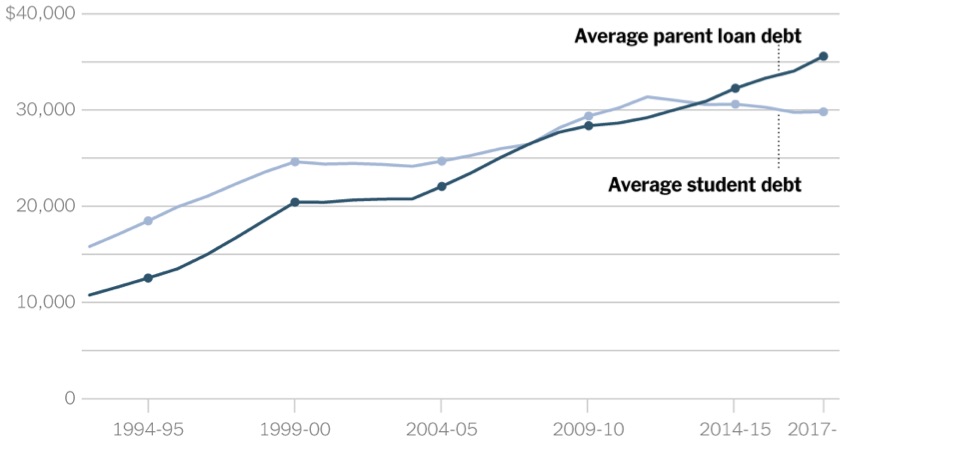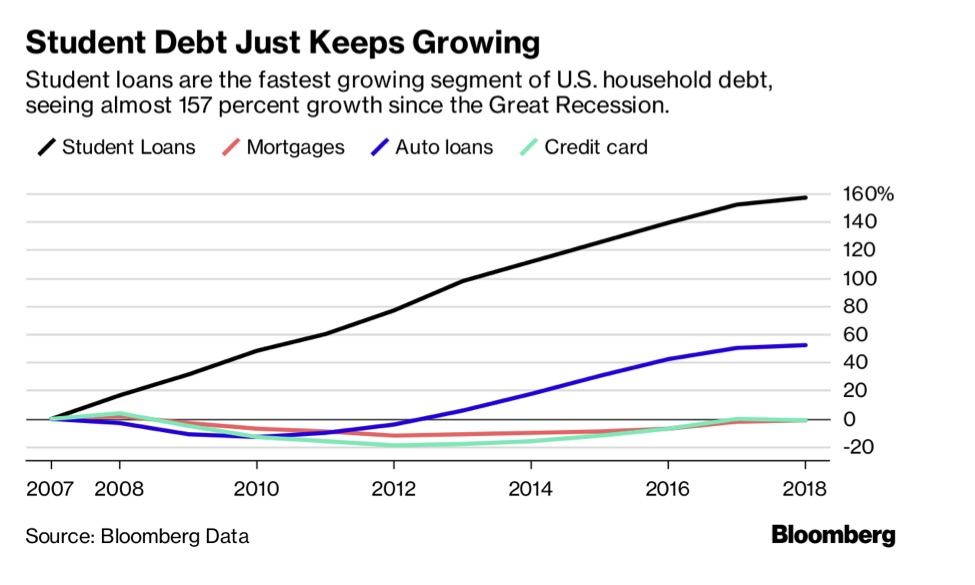
The century old American college campus, at its inception, bore little resemblance to the modern “multiuniversity.” What will a college campus look like fifty years from now? Given the disturbing rise of student debt (see below), there is a school of thought that college is a failed business model and, in time, brick and mortar universities will wither away to the point where the entire nation is serviced by a handful of institutions. How can this be, in a nation where there are thousands of four-year colleges?


In recent years, Massive Open Online Courses (MOOCs) have emerged to allow virtually anyone to take courses in any subject. Typically, the course providers partner with major universities to leverage “star professors” associated with these institutions. Although MOOCs are in the early goings, these courses can be graded and used for credentialing. In fact, professions which require continuing education encourage this method of study.
"College credentials constitute a form of peerage for Americans, who have no tradition of titled gentry. College social life trains elites for the networking and socializing associated with high paying careers, experiences that won’t show up on Indeed.com."
While many schools profit from a MOOC subdivision, the higher education establishment, writ large, faces a serious threat—namely, that these online classes could eliminate the need for private instruction (just as the recording industry marginalized live music). Colleges respond to this challenge with some combination of two strategies. First, educators argue that online courses are no substitute for the intimate nurturing of a small classroom experience. However, this argument belies the fact that many college courses are larger survey courses where the student has little interaction with the professor. Outside of very small (and very expensive) liberal arts colleges, most universities have used “economy of scale” models and MOOCs are simply a logical extension of this approach.
The second tack taken by college administrators is credentialing. If a MOOC is open to everyone, then the course or degree has less value as a credential. In this model, an elite university is not selling education, but the status associated with admission. The problem with this argument is that many colleges are not particularly selective, and thus they cannot credibly sell selectivity. In addition, students attending elite schools could potentially prove their intelligence in less costly ways. If the MOOCs were scored on a percentile basis, the best students could be ranked on their relative position; that is, a 99 percent on a MOOC course would itself become the credential. This is essentially what elite universities are doing by marketing student SAT scores. Can’t the genius student remove the university middle man and simply sell his own native intelligence? One often hears the narrative of the “millionaire who dropped out of college.” But this tiny set of tech savvy geniuses creates a survival bias, obscuring the many failed would-be entrepreneurs with high IQs. By and large high school students do not seek employment by merely showing elite college acceptance letters. For every Mark Zuckerberg, there are probably 1,000 Elizabeth Holmes.
There is a rich academic literature on the value of education pitting the “human capital” model against “signaling” theory. Human capital proponents emphasize the lifetime earnings added from a college degree. Much of this data is outdated, however, and includes cumulative earnings from cohorts where there were fewer college graduates in general. A more controlled data set, adjusting for IQ, demonstrates the value of a non-STEM degree from a non-elite college is limited.[1] The signaling model is supported by the fact that occupations that once did not even require a high school diploma (say, firefighter) are now routinely filled by college graduates, despite there being no cognitive change in the job tasks performed. Furthermore, almost all the wage premium is connected to the sheepskin effect of having completed a degree, with no bonus for having nearly completed the degree.[2] Signaling proponents also point to the fact that education is the only product where the consumer (student) is happy when the seller (teacher) does not provide the service, that is, cancels class.[3] If college is nothing more than the product of status arms races between prospective job candidates, then could eliminating their state support result in employers choosing more economical signals?
If MOOCs are an existential challenge to universities, then by extension they would threaten collegiate social life as well. Ironically, however, partying and socializing, though much maligned by educators, could be the savior of American colleges (particularly the top 100 or so), for the hedonistic aspects of college life cannot be substituted by technology. High school students will still want to attend college for its socio-sexual aspects, even more so as “adulthood” is delayed with each passing generation. The bundling of residential college life with “good times” has made it difficult for rational neo-liberalism to decouple technical knowledge from social learning.
Colleges are now “ranked” not only by their academic status, but also by whether they are a “party school” and/or whether they have good looking students (these typically go hand in hand). One would think that a college administrator would be aghast at seeing his institution ranked high in a list of “party schools.” And yet the entrepreneurial administrator can secure more applications—and ultimately more revenue—via a “work hard/party hard” school brand. (This moniker is acceptable to both parents and students—see the Duke students pictured below).

Parents are strange bedfellows to this arrangement. While no father wants to see his daughter in a compromising frat party “Insta,” social norms demand the college degree as a signaling credential. Furthermore, parents in the higher economic strata internalize their child’s choice of college as part of their own conspicuous consumption. It is simply bad parenting to not send your child to the best college to which he is admitted. Such is the significance of rankings, to parents, that colleges have rebranded themselves as a “Catholic Ivy” (Georgetown, Notre Dame), a “Public Ivy” (Michigan, Virginia, Berkeley), the “Ivy of the South” (Duke), the “Ivy of the Mid-South” (Vanderbilt), and the “Ivy of Texas” (Rice).
Nor is the social class signal provided by college admissions easily replaced. College credentials constitute a form of peerage for Americans, who have no tradition of titled gentry. College social life trains elites for the networking and socializing associated with high paying careers, experiences that won’t show up on Indeed.com. A MOOC credential cannot provide the social network benefits of an elite college degree. What of middling schools? So long as the rankings game lets students think they are attending a near elite school, then the pretender institutions will be safe as well. What of the autodidact who eschews college? He will probably fare poorly. A high IQ individual, with limited academic credentials, typically has an anti-conformist personality that is not well suited for the private sector; Edward Snowden, a whistleblower with a messiah complex, is the archetype for this highly intelligent slacker.
Notes
[1] With many STEM types going to Wall Street, the technical degree is itself a signal of mathematical ability and conscientiousness.
[2] The lack of core curriculum or exit exams, for most universities, eliminates any guaranteed learned content. That there are a large number of students who drop out of college after two or three years is astonishing, suggesting once again there are too many people in college without the requisite cognitive skills. The value added of a completed associate’s degree is typically de minimis, outside of technical degrees such as nursing.
[3] The superficial appeal of a pure human capital model is exploited by leftist politicians advocating “free college” and “loan forgiveness” for all; low information voters associate degrees with increased earnings without considering that the only real change has been the stigma of having no college degree.

